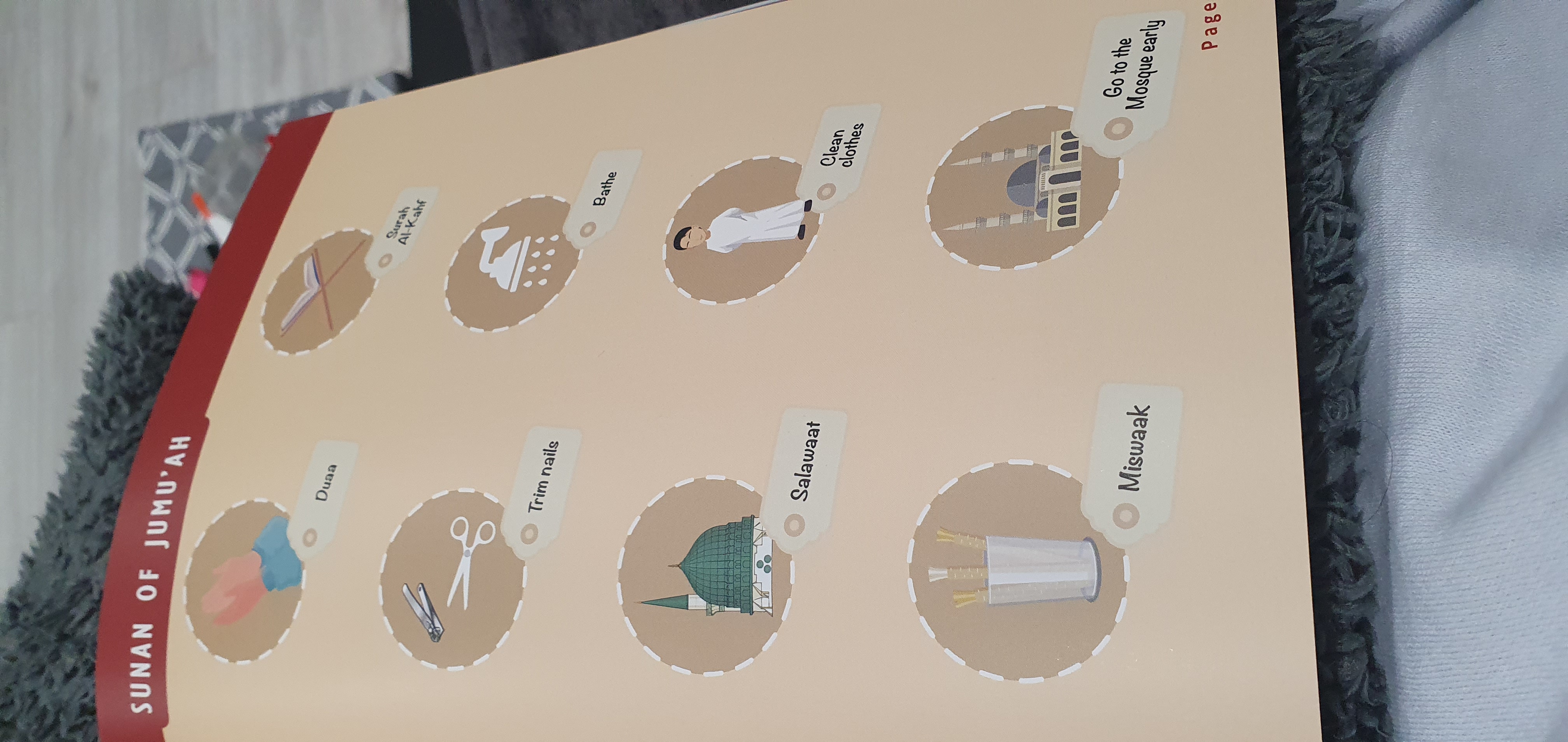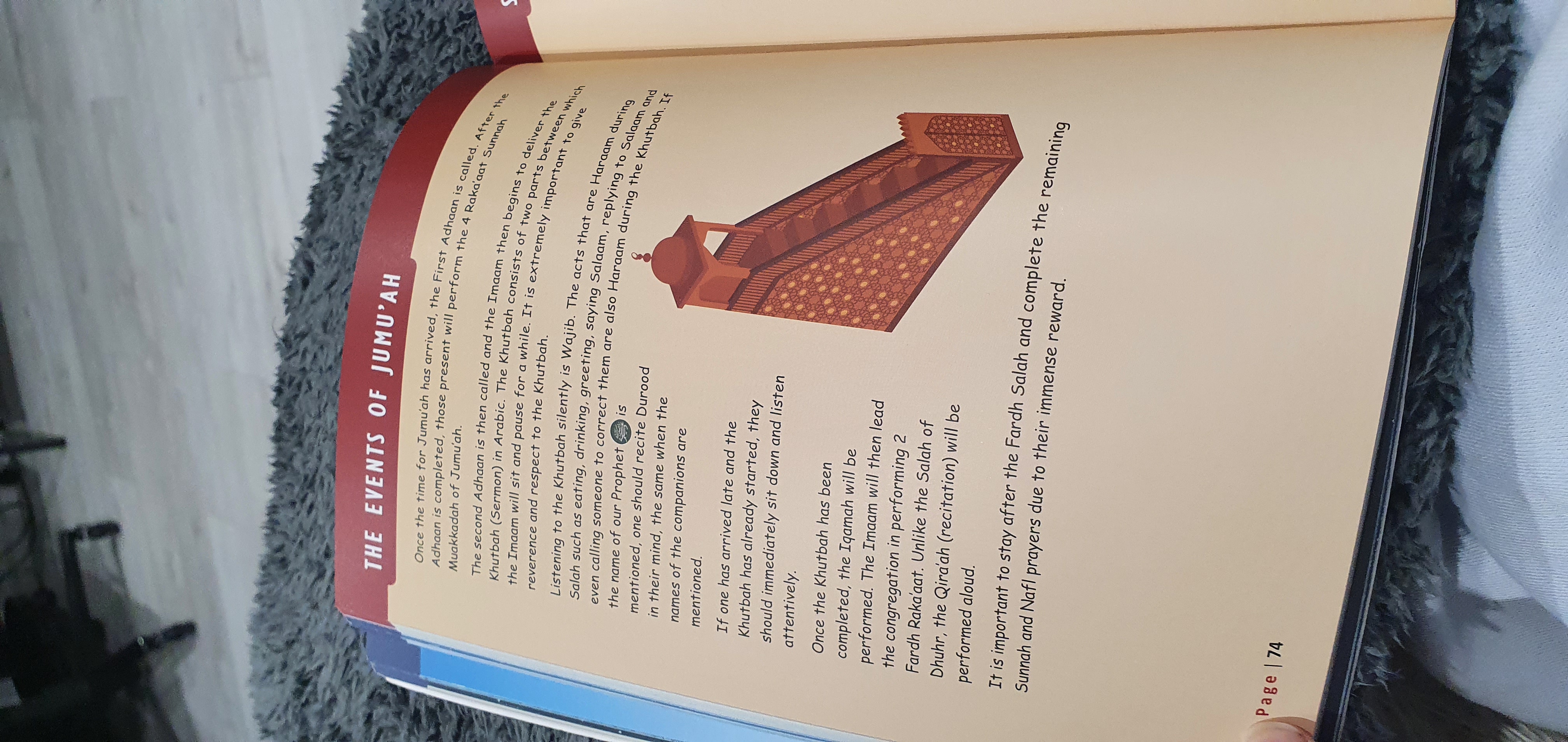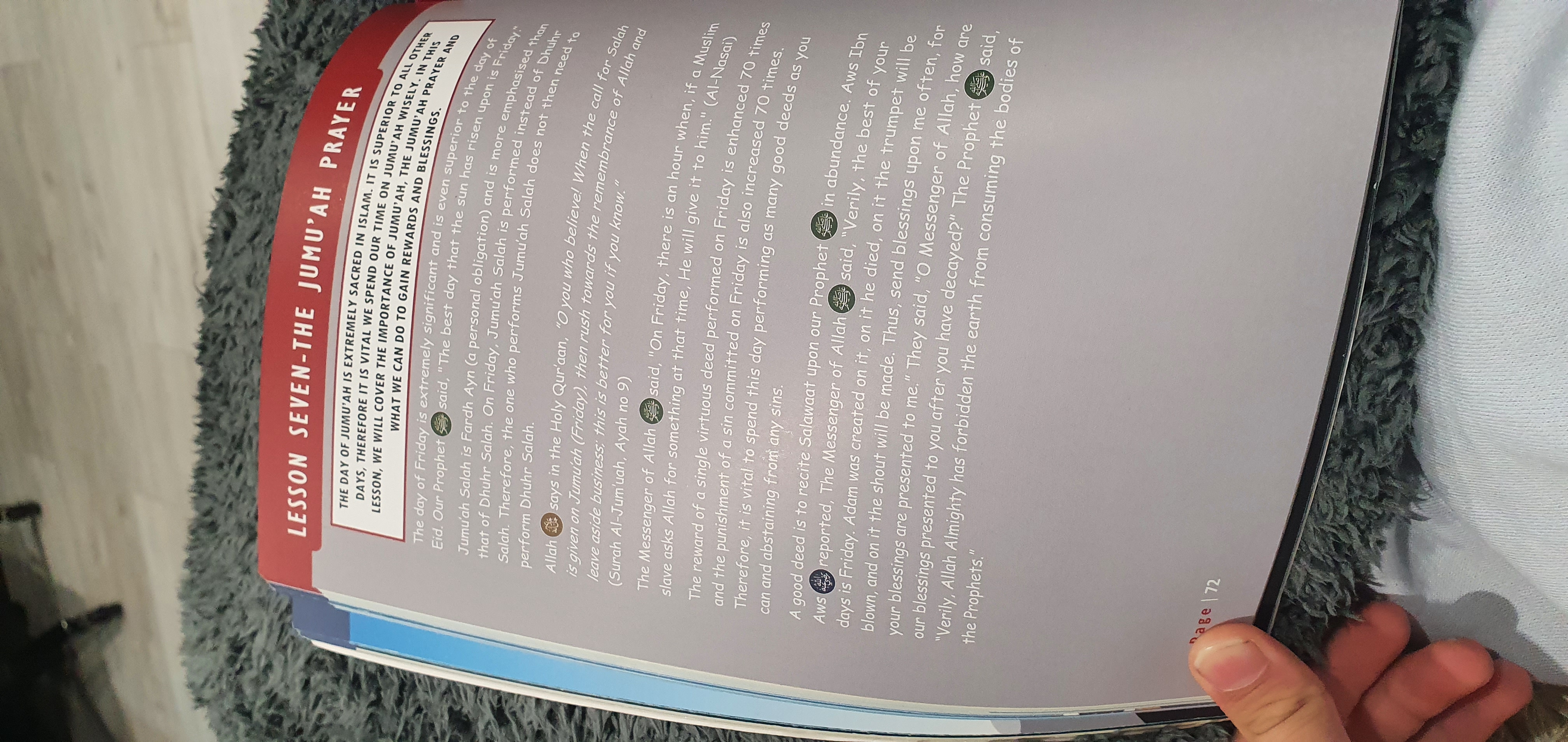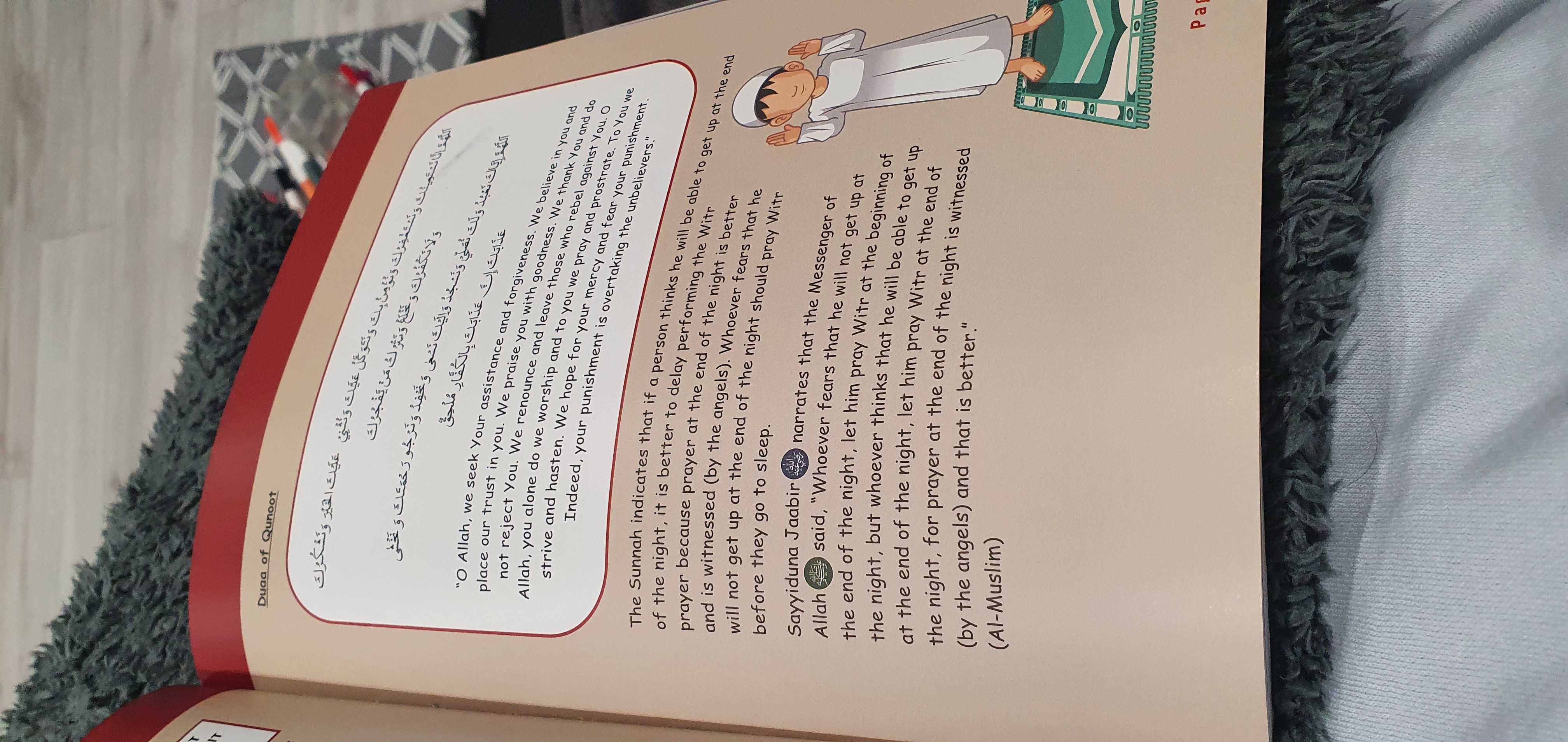Jumu'ah: Practices, Events, and Conditions for Prayer
Sunan of Jumu'ah

The image outlines various recommended practices (Sunan) for observing Jumu'ah (Friday prayer) in Islam. Here are detailed notes about each practice listed:
| Practice | Explanation |
|---|---|
| Duaa | Making supplications is encouraged, as this is a time when prayers are particularly accepted. |
| Trim nails | Personal grooming is emphasized; trimming nails promotes cleanliness and attention to personal hygiene. |
| Salawaat | Sending blessings on the Prophet Muhammad is a virtuous act, especially on Fridays. |
| Bathe | The Sunnah includes performing Ghusl (full-body ritual washing) before attending Jumu'ah prayers to ensure cleanliness. |
| Clean clothes | Wearing clean and presentable clothing reflects a respect for the prayer and the congregation. |
| Miswaak | Using a miswaak (tooth stick) for oral hygiene is encouraged, aligning with the Sunnah of cleanliness before prayers. |
| Go to the Mosque early | Arriving early for Jumu'ah allows for additional prayers and to listen attentively to the Khutbah (sermon). |
Summary
These practices are meant to enhance the spiritual experience and physical preparation for Jumu'ah, ensuring that attendees are both respectful and ready for communal worship. Engaging in these actions signifies mindfulness about one's faith and the importance of gathering in prayer.
Extended readings:
The Events of Jumu'ah

-
First Adhaan
Once Jumu'ah time arrives, the First Adhaan is called to signal the start of the prayer time. This is crucial for notifying worshippers to prepare for the upcoming prayers and sermon. -
Muakkadah Sunnah
After the First Adhaan, those present perform the 4 Raka’aat Sunnah Muakkadah of Jumu'ah. These are highly recommended prayers that can enhance spiritual reward. -
Second Adhaan
The second Adhaan follows, which calls the congregation for the Khutbah (sermon). This indicates that the sermon is about to begin, marking a shift in the nature of worship from personal prayer to communal listening. -
The Khutbah
Delivered in Arabic, the Khutbah consists of two parts. It’s essential for the Imam to pause at intervals so the congregation can absorb the messages being shared. The role of the Khutbah is crucial in Islamic teachings as it provides guidance and reflections pertinent to the community and individuals. -
Listening to the Khutbah
It is obligatory (Wajib) to listen to the Khutbah silently. Engaging in activities like eating or talking during this time is considered disrespectful. The act of reciting Durood (salutations upon the Prophet) is encouraged when his name is mentioned. -
Late Arrival
If someone arrives late and the Khutbah has started, they should sit quietly and listen. This highlights the importance of the Khutbah in the overall structure of Jumu'ah. -
Completion of the Khutbah
After the Khutbah, the Iqamah is performed to call the congregation to prayer. The Imam leads 2 Farh Raka’aat, with the recitation performed aloud. This differentiates Jumu'ah from the regular Dhuhr Salah. -
Staying After Salah
Worshippers are encouraged to stay after the Farh Salah to complete remaining Sunnah and Nafl prayers due to the immense rewards attached to them. This underscores the importance of maximizing spiritual benefits during this special day.
Extended readings:
Pre-Conditions of Jumu'ah Prayer

-
Being free from illness
Jumu'ah Salah is not obligatory for those who are ill, as illness can hinder one's ability to attend the mosque comfortably. It emphasizes the importance of health in fulfilling religious duties. -
Unable to travel to the mosque
Individuals who cannot access the mosque without significant hardship, such as distance or adverse conditions, are exempt from this obligation. It highlights the principle of accessibility in religious practices. -
Being male
The requirement for Jumu'ah Salah does not fall upon females in the same way it does for males, although women are encouraged to participate if able. This point reflects cultural roles within certain Islamic traditions. -
Maturity
Jumu'ah Salah is not mandatory for those who have not yet reached puberty, emphasizing the importance of understanding and consciousness in religious responsibilities. -
Sanity
Those who are mentally incapacitated are exempt, aligning with many other religious obligations that require a certain level of understanding and intention. -
Having the faculty of sight
This implies that visually impaired individuals can still participate in alternative forms of worship, signifying an inclusive approach to faith. -
Having the capability to walk
It indicates that physical ability is taken into account, allowing for exemptions based on one's capability to attend. -
Not being imprisoned
Those deprived of freedom are not held accountable for not attending Jumu'ah, as it would not be feasible. -
Not having a valid fear of harm due to weather or violence
Safety is a priority in religious observance; thus, individuals can miss Jumu'ah if attending poses a risk to their well-being.
Summary of Actions if Conditions Aren't Met
- For those who missed Jumu'ah Salah: They should perform Dhuhr instead.
- If Dhuhr time has passed: They must perform Dhuhr as Qadaa, indicating a structure in managing missed prayers.
This context encourages flexibility within Islamic practices, ensuring that the well-being of believers remains paramount while also promoting a sense of community worship during Jumu'ah.
Extended readings:
Jumu'ah Prayer Notes

Importance of Jumu'ah
- Significance: Jumu'ah (Friday) is considered a sacred day in Islam, superior to other days.
- Thoughts: This emphasizes the need for Muslims to prioritize this day in their spiritual obligations.
Jumu'ah Salah
- Obligation: Jumu'ah Salah is a personal obligation (Farh Ayn), more emphasized than regular Dhuhur Salah.
- Additional Information: On Fridays, congregational prayer replaces the regular Dhuhur prayer, demonstrating community unity in worship.
Quranic Reference
- Surah Al-Jumu'ah: “O you who believe! When the call for Salah is given on Jumu'ah (Friday), then rush towards the remembrance of Allah and leave aside business.”
- Explanation: This verse highlights the importance of attending prayer over worldly affairs, reinforcing spiritual duty.
Rewards for Virtuous Deeds
- Increased Rewards: Good deeds on Friday are rewarded 70 times more, while sins are punished at an increased rate.
- Implication: This provides strong motivation for Muslims to engage in good practices on Jumu'ah, enhancing spiritual gain.
Salawat upon Prophet
- Reciting Salawat: It is highly encouraged to recite Salawat (blessings) upon the Prophet Muhammad on Fridays.
- Thoughts: This practice connects believers spiritually and shows honor to the Prophet, reinforcing community and personal faith.
Additional Traditions
- Creation and Events: Various significant events related to creation and the end of times are associated with Friday, such as Adam’s creation and the blowing of the trumpet.
- Reflection: Understanding these events cultivates a deeper appreciation for the significance of Fridays in Islamic tradition.
Summary
The lesson on Jumu'ah Prayer elucidates the critical role of Fridays in a Muslim's life, underlining its spiritual and communal importance through obligations, rewards, and practices tailored for this day.
Extended readings:
Du'a of Qunoot

-
Meaning of the Du'a: The Du'a begins with a supplication to Allah, seeking assistance and forgiveness. It emphasizes the essence of worship, placing trust in Allah, and renouncing those who oppose Him.
- Thoughts: This reflects a deep sense of reliance on divine help and underscores the importance of sincerity in worship.
-
Sunnah Guidelines on Witr Prayer: The Sunnah mentions that delaying the Witr prayer until the end of the night is preferable if one believes they can manage to wake up. However, if there is doubt about waking up, it is advised to pray early.
- Additional Information: This guidance emphasizes the importance of commitment to prayer while accommodating individual circumstances, promoting a flexible approach to worship.
-
Hadith Reference: The text cites a narration by Sayyiduna Jaabir that adds authority to the guidance about praying Witr at the end of the night being superior, as it is witnessed by angels.
- Thoughts: The mention of angels witnessing the prayer adds a spiritual significance, reinforcing the belief in the rewards associated with prayer in the last part of the night.
| Key Points | Details |
|---|---|
| Du'a Focus | Seeking assistance, forgiveness, and expressing trust in Allah. |
| Witr Prayer Timing | Preferable to pray Witr at the end of the night, unless unable to wake up; pray earlier in that case. |
| Importance of Witnessing Angels | Praying Witr at the end provides the benefit of being witnessed by angels, enhancing its spiritual value. |
Extended readings: